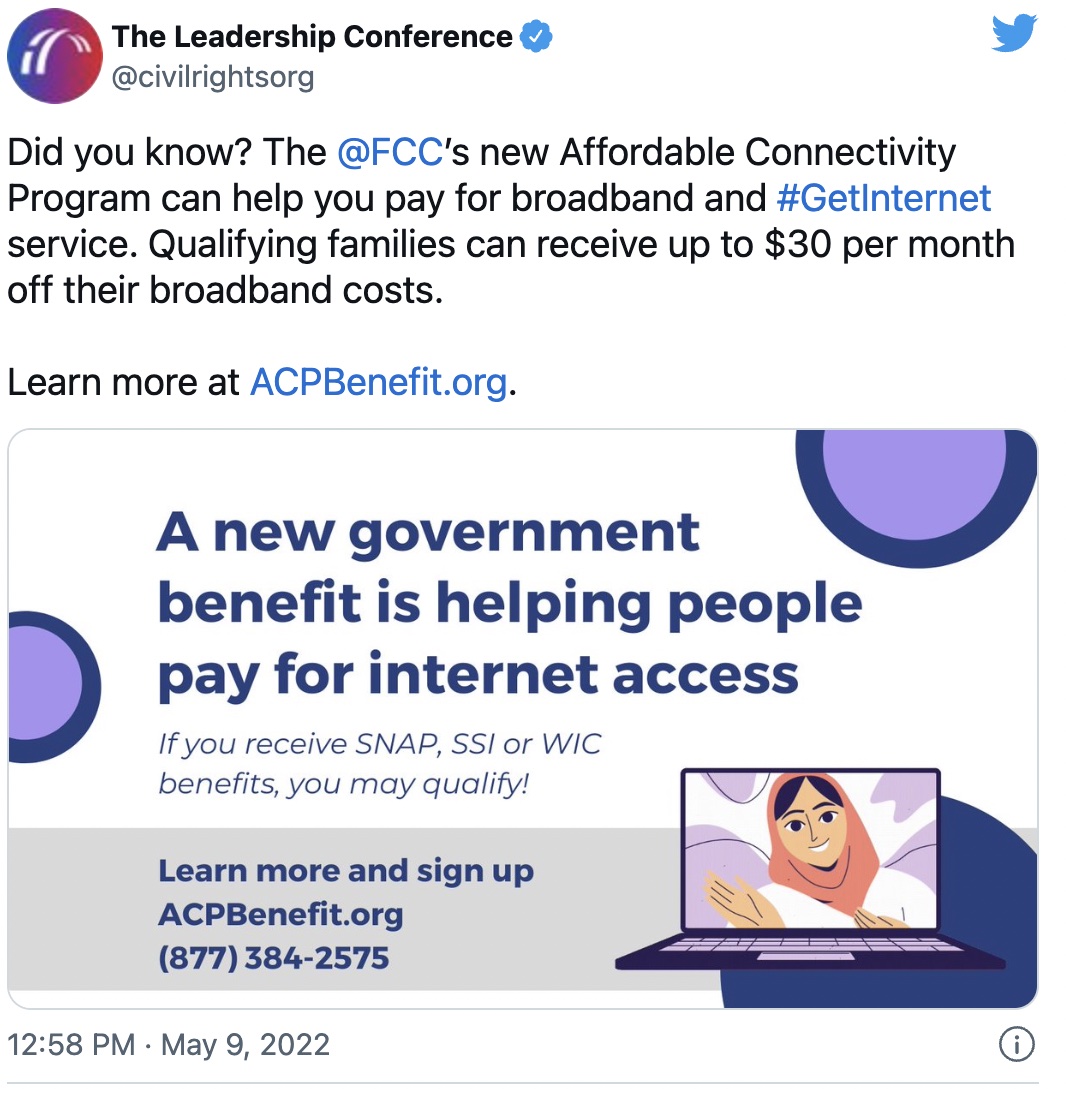How the Federal Government Is Helping More People Access the Internet
Wednesday, June 15, 2022
Digital Beat
How the Federal Government Is Helping More People Access the Internet
This article originally appeared on The Leadership Conference on Civil and Human Rights website; it is reprinted here with permission.
“You have one hour to complete the exam. Good luck.” With this statement, the most stressful hour during midterm and final exam seasons at our respective universities began.
We struggled to recall the material we reviewed the night before, when we attempted to cram months of class lessons into a few hours of studying. We prayed silently for a grade that would boost our GPA while we frantically raced to complete the assignment. For many college students like us, the COVID-19 pandemic pushed our lectures, classroom discussions, and examinations into a virtual environment. Along with the stresses we normally faced, a new fear arose: Would our Wi-Fi abruptly stop working?
In the context of a virtual classroom, the loss of internet connection often represents the loss of academic success. It could happen in the middle of an online multiple-choice exam with the sudden appearance of an error message: “No internet connection” — followed by a frozen website. The timer would continue to count down until we had to submit the test. When our network finally came back online, we would then rush through the remaining questions with haphazard guesses. Sometimes while sitting in our Zoom class during a particularly difficult math lesson, our professor’s sound and video would unexpectedly freeze. A gray bar would pop up on the screen: “Your internet is unstable.” A few minutes later, our internet connection would resume, but our professor would already have moved ahead four steps. These inconveniences occurred regularly even though we have the privilege of access to high-speed internet. The situation is far worse for students who lack this privilege.
Recognizing the need for internet access during the pandemic, the federal government in 2021 implemented the Emergency Broadband Benefit (EBB) program, which temporarily provided discounts on internet bills, in an effort to bridge the digital divide and help the most marginalized families and individuals access the internet at home. EBB has now been replaced by the Affordable Connectivity Program (ACP). This new program establishes a more permanent, long-term solution to address one of our country’s most pressing issues by allowing even more families to qualify for financial assistance. It provides a monthly discount of up to $30 for eligible families’ internet services and up to $75 for households on tribal lands. It also offers a one-time subsidy of up to $100 for the purchase of a computer, laptop, or tablet from an internet service provider.

For college students, reliable broadband access isn’t just about watching a new Netflix series or playing video games. It affects our very ability to educate ourselves and, by extension, to shape our futures and contribute to our democratic society. It allows us to read our online textbooks, to access articles and books for our research assignments, and to upload resumes for jobs and internships. When we cannot find stable internet in the comfort of our homes, students must rely on searching for free Wi-Fi in coffee shops, libraries, and even the parking lots of fast food restaurants.
These issues of internet access don’t just affect college students. They affect all students — from elementary schools to high schools to institutions of higher education. For the past four years, I (Aditi) have tutored elementary school students in Ward 8 of Washington, D.C., which is home to a predominantly Black community. The pandemic exposed and exacerbated the barriers that unfairly deprive these children of educational opportunity, including access to broadband. Many families in Ward 8 did not have access to the necessary technology for their children to attend remote classes; thousands of students were unaccounted for after the classroom moved over to virtual platforms. I did not see my seven-year-old tutee for a year because her family did not have internet in the home, and she fell further behind in her literacy skills during that academic year. Without internet access, these students were unable to access a fundamental civil and human right: the right to an education.
In the 21st century, accessible and affordable broadband is a necessity — not just a luxury. The high cost of internet services and the limited broadband infrastructure in certain areas across the country mean that many vulnerable households are excluded from equal access to education, employment, health care, the economy, and the ability to stay connected to family and friends. The ACP presents a valuable opportunity to begin to rectify these disparities.
We must work to spread information about the ACP — located at GetInternet.gov — within our networks. We must pursue these efforts for the sake of the students who cannot reach their fullest potential because they lack access to the most basic resources in our modern society.
Christina Hitchcock and Aditi Mittal were spring 2022 undergraduate interns at The Leadership Conference on Civil and Human Rights.
The Benton Institute for Broadband & Society is a non-profit organization dedicated to ensuring that all people in the U.S. have access to competitive, High-Performance Broadband regardless of where they live or who they are. We believe communication policy - rooted in the values of access, equity, and diversity - has the power to deliver new opportunities and strengthen communities.
© Benton Institute for Broadband & Society 2022. Redistribution of this email publication - both internally and externally - is encouraged if it includes this copyright statement.
For subscribe/unsubscribe info, please email headlinesATbentonDOTorg






